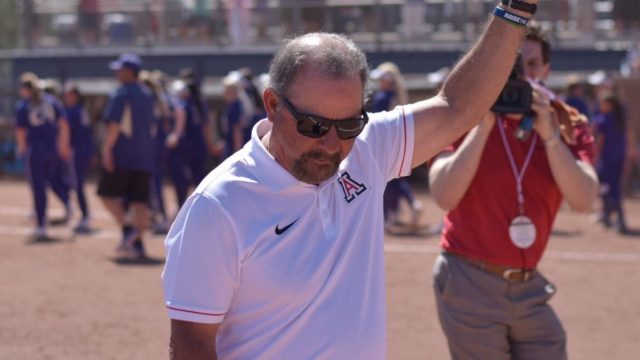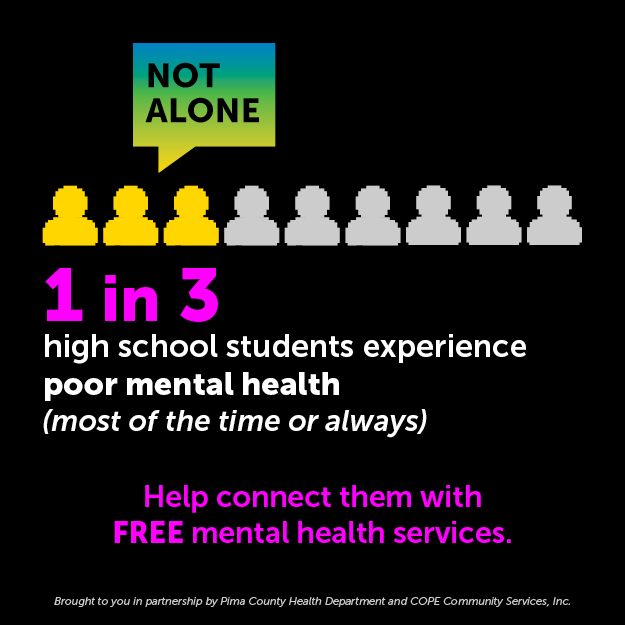
Mike Candrea acknowledges the crowd following his 1,500th victory at Arizona last month. (Photo courtesy Arizona Athletics)
Arizona Wildcats softball coach Mike Candrea will be part of the 2017 induction class for the National Softball Hall of Fame. That begs one question.
He wasn’t already in?
Candrea, who has won eight national titles at Arizona, was also the head coach for Team USA for two Olympic cycles, winning the gold medal in 2004 and the silver in 2008.
He will be inducted this October for “meritorious service.”
Yeah, they’ve got that right.
Beyond the international competition, the national championships, the victories (more than 1,500 at Arizona, a Division I record) and the All-Americans (58, including four national Player of the Year awards), Candrea helped fuel the sport’s rise in the 1990s.
Candrea, one of the few men coaching college softball back in his early days, helped other coaches in the sport raise the bar by sharing his practice techniques, his hitting tips, his motivational strategies … all of it. That was not common practice among softball coaches in the late 1980s and early 1990s.
“To grow the sport,” he said recently, explaining why he was so open.
His sharing philosophy came from his baseball background.
“You’d go to the baseball convention and you sit around and tell stories and talk about the game and find out there really are no secrets,” he said.
“I felt when I got into softball, that I had always been one of those people who foremost tried to grow the game. And I realize that everything I know I picked up from someone else. I tweaked it here and tweaked it there, but I don’t feel like anything is unique and, therefore, I don’t feel like I own anything.
“So when people want to grow as coaches it’s my responsibility to help them grow. And I still do it today.”
Rhonda Revelle is in her 25th season as Nebraska’s softball coach. After her first season, she asked Candrea for his best piece of advice. His answer: Make sure your hitters see live pitching every day. She listened. The Nebraska team batting average jumped 100 points the next season.
In 1996, she spent a few days in Tucson watching Arizona fall practice. In 1998, she led Nebraska to the first of three appearances in the College World Series.
“I told him that the information he shared with me has helped me accelerate the pace,” she told me in a 1998 interview.
Candrea helped accelerate the pace for a wide swath of college softball. That what he has meant to the sport. That’s his meritorious service.
To his players, he has been something else entirely.
“Coach Candrea is more than just a softball coach,” said former Arizona All-American first baseman Amy Chellevold-Hillenbrand.
“He’s been a mentor, friend and father figure to me and hundreds of players he has coached. One thing that we have all been taught as one of his student-athletes is balance in life. I carry that belief system in my life today and try to teach it to my children.
“One of my favorite things to do when I’m in Tucson is stop by the office to see Coach, get a big hug and catch up on softball and life. My life wouldn’t be the same without him.”
Every one of his players has heard him talk hundreds of times of balancing life, physically, emotionally and spiritually.
“Words to live by,” former player and current Arizona administrator Erika Barnes said when Candrea won his 1,500th game at UA last month.
“He has always talked about, starting from when he was recruiting you to when you were a player and after that, that it’s important to him that you come out of here a better person than a player. And he truly lives by that.”
Former Arizona players Jennie Finch and Leah O’Brien-Amico, also gold-medal-winning Olympians, are in the Hall of Fame.
“I love him like a father,” O’Brien-Amico told me last month. “I feel like he was the one who was able to get the best out of me as an athlete.”
















